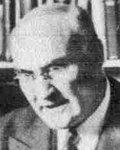HERMENEUTICS:
The Science of Interpreting the Scriptures
Study earnestly to present yourself approved to God, a workman that does not need to be ashamed, rightly dividing (Strong's: dissecting correctly) the Word of Truth.
- 2 Timothy 2:15 - |
* * * RULES OF INTERPRETATION
Dr. David L. Cooper
Editor's note - In many places in the Scriptures, the believer is encouraged to study the written Word as the foundation for a holy, godly and fruitful life before God and man. But how are we to study this unified, but daunting, compilation of sixty-six books written by over forty authors between nineteen hundred and thirty-five hundred years ago in languages and cultures that may be totally foreign to us? Enter the science of hermeneutics.
To understand hermeneutical principles is to be equipped for an intelligent study of the Word of God, tending greatly to our approval before God as workmen that do not need to be ashamed. In our previous seven Shofars, we've been treated to sound instruction by Dr. David L. Cooper, founder of the Biblical Research Society, in interpreting Scripture, a critical skill to master, particularly in an age in which the Babel of interpretations is legion. With "Rules of Interpretation," a study that will span, perhaps seventeen Shofars, we are engaging what will be our most extensive and detailed study thus far on the topic and continue to hone our skills in rightly dividing the Word of Truth that we might be a clear and accurate voice for the Lord. Let us apply ourselves.
* * * |
* * * Part Two: THE USE OF LANGUAGE In order to understand the Scriptures one must know the use of language: the grammar, the specific meaning of words, and the fundamental laws of speech especially the principles which are characteristic of the Scriptures.
I. A knowledge of the use of language is important because:
A. Intelligible language expresses a logical process of the mind.
B. There are certain definite fixed laws of the mind according to which all normal persons think and act.
Examples: laws of observation, laws of deduction, laws of inspiration etc.
C. Language either written or spoken is governed by definite specific laws that are just as real as the laws governing physical matter.
1. (for example) Laws governing the uses of metals, and those controlling the explosion of gases and directing of electrical energy are employed in the construction of an automobile motor: if these basic Laws are ignored the motor will be a failure.
2. In the study of the Scriptures, if the basic laws of language and interpretation are ignored, or are not employed, the message God intended to convey may be misunderstood or misinterpreted in part or in whole.
II. In the Bible, which is God's revelation to man, the thought and also the very words by which the ideas were expressed in the original tongues were given infallibly by the Holy Spirit of God.
A. In the Scriptures the Lord said exactly what He meant and meant just what He said.
B. The prophets and apostles spoke and wrote in the language of the people to whom they ministered.
C. The Lord had a very definite idea to convey whenever He made a statement.
D. A careful and honest appraisal of any statement found in the Scriptures will reveal that it has a definite and specific meaning: and a solemn and sincere purpose should be exercised to learn exactly what is said in the Scriptures and to arrive at the precise idea of the inspired writer.
* * * Reprinted by permission of the Biblical Research Society, where other outstanding studies by Dr. Cooper may be found.
Links to the entire "Rules of Interpretation" series may be found at http://www.biblicalresearch.info/page7.html.
A brief biography of Dr. Cooper appears at http://www.hadavar.org/brsocietyfounder.html.
Return to Home Page
 |


